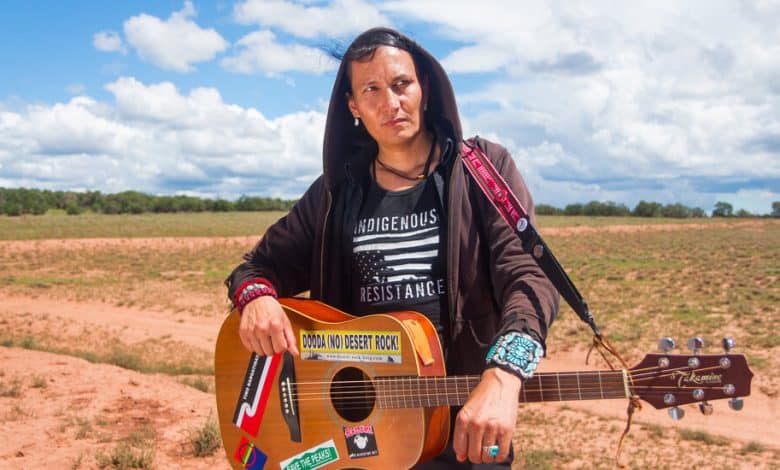Klee Benally, Navajo Activist and Artist, Dies at 48

Klee Benally, a dynamic Navajo activist, artist and punk-rock musician who championed Native American and environmental causes, died on Dec. 30 in Phoenix. He was 48.
His death, in a hospital after a short illness, was confirmed by his sister, Jeneda Benally.
For decades, Mr. Benally, who lived in Flagstaff, Ariz., fought the expansion of the Arizona Snowbowl Ski Resort on one of the San Francisco Peaks, a mountain range just north of Flagstaff that 13 tribes consider sacred. He also fought the resort’s use of treated wastewater to make snow, a practice that Native Americans and environmental groups said was poisoning the ecosystem. He protested against a pumice mine on those same peaks, and against uranium mining and transport in the area.
He campaigned for the rights and care of Indigenous homeless people and against racial profiling. He made films and art about his activism.
He was a community organizer and a youth counselor; he taught media literacy and film to Indigenous teenagers; and he marched against the celebration of Thanksgiving. Late last year he published a book, “No Spiritual Surrender,” about his efforts practicing what he called Indigenous anarchy, and he created a board game, “Burn the Fort,” in which Native American warriors fight off colonizers (and learn some history while doing so).
He chained himself to an excavator, was charged with trespassing and joined numerous legal complaints.
But his first foray into activism was through music, in 1989. He was 14 when he and his siblings, Jeneda and Clayson, formed Blackfire, a high-velocity punk band that mixed traditional Navajo chants and music with protest songs about the oppression of Indigenous people.
Mr. Benally embraced the middle-finger-to-the-world punk ethos — he loved the Ramones, whose music he introduced to his mother, a folk singer — and he could really shred a guitar. The Ramones loved Blackfire back: C.J. Ramone produced the band’s first EP, “Spirit in Action” (1994), and Joey Ramone sang on two of the songs on “One Nation Under” (2002), its first full-length album.
Critics were admiring, too. In 2007, David Fricke of Rolling Stone touted Blackfire’s fourth album, “[Silence] Is a Weapon,” as “pure ire, CBGB-hardcore-matinee protest with jolts of ancient chorale.”
The band played at South by Southwest and other music festivals but declined to play in bars, at least at first. Mr. Benally thought it would be hypocritical, given that alcohol abuse was an issue on reservations. In addition, at the time the Benally siblings were all under 21.
“Some people watch too many movies and think John Wayne killed all the Indians or they’re out dancing with wolves,” he told The Albuquerque Journal in 2003, explaining Blackfire’s mission to educate audiences. “But in reality there are over 500 nations throughout the U.S. carrying on their cultures, their own individual ways of life, their own languages and their own ceremonies.”
Klee Jones Benally was born on Oct. 6, 1975, in Black Mesa, Ariz., on the Navajo reservation near Flagstaff. Music and activism ran in the family. Klee’s father, Jones Benally, is a traditional Diné (as the Navajo call themselves) medicine man; his mother, Berta Benally, is an activist and folk musician of Russian-Polish Jewish heritage who grew up in the folk scene of Greenwich Village. The couple met in Los Angeles, where she was working with Hopi elders.
Klee and his siblings were brought up with their father’s Diné traditions, and they grew up performing traditional dances. Their mother introduced them to the folk canon; Blackfire would later set some of Woody Guthrie’s poems to music. The area where they lived was part of a land dispute that forced the relocation of thousands of Navajo people, and attending protests became a family affair.
In addition to his sister and his parents, Mr. Benally is survived by his wife, Princess Benally, and his brother.
Blackfire disbanded after two decades, mostly so the Benally siblings could concentrate more directly on advocacy and activism.
Mr. Benally often framed his environmental work in terms of religious freedom. “As Indigenous people in the so-called United States, we don’t have guarantees for our religious freedoms like the rest of you,” he told The Arizona Republic in 2013. “This is a struggle for cultural survival — the struggle to protect sacred spaces.”
Mr. Benally was a local hero in Flagstaff, where he founded a number of nonprofit organizations and aid groups. He was both angry and pragmatic; he liked to say that everyone was indigenous to somewhere.
“He was a powerhouse of anticolonial thought and action — ever ready to protect the land,” Dallas Goldtooth, a Native American activist and actor, wrote on X, formerly known as Twitter.
Mr. Benally explained his worldview in a 2020 interview with Spirituality Health magazine: “As an artist, there’s no dichotomy between art and life with our traditional teachings as Diné people. There’s no separation; our life is creation. So our creative expression comes in many different ways. What I look at is: What are the issues facing our communities, and what strategies can be most effective? Is it going to be through song? Is it going to be through prayer or action? Or can it be all of them?”